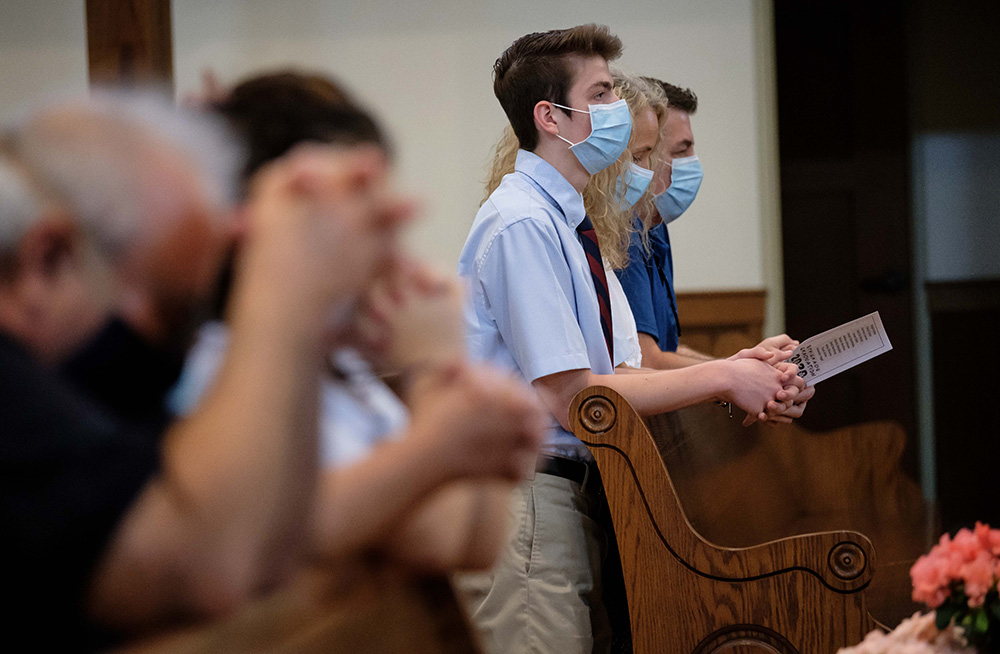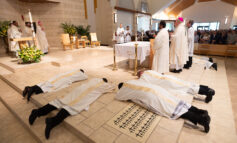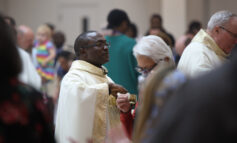
Eighth-grader Joseph Diehl kneels as St. Mary’s Catholic School eighth-graders celebrate graduation with a Mass and parade at the school in Sherman on May 21. (Photo by Kevin Bartram)
By Father Jacob Dankasa
Special to The Texas Catholic
In the parable of the prodigal son (Luke 15:11-32) there are three major characters: the father, the younger (prodigal) son and the older son. In many cases, our emphasis lies on the younger son, from which the parable derived its name. At other times we emphasize the father, who characterizes God in the story. Only occasionally do we talk about the older son. Not so much is made of the older son because of his limited appearance in the story, but he is an important element of the parable. He characterizes another extreme which the parable also intends to amplify; the story is not just about the character of the prodigal son. In fact, the older brother is a very important part of the story, because he represents the Pharisees and scribes to whom Jesus addressed this parable. The parable is his response to their unwillingness to welcome a sinner: “The tax collectors and sinners were all drawing near to listen to him, but the Pharisees and scribes began to complain, saying, ‘This man welcomes sinners and eats with them.’ So to them he addressed this parable” (Luke 15:1-3).
I want to focus on the older brother in this reflection because he exemplifies our sometimes near, but sometimes distant, relationship with God.
The older brother appears as the “good guy” who remained with the father. He didn’t demand his share of inheritance, nor did he live a life of dissipation like the younger son. But from all indications, even though he was around the father, it appears that he lived like one who was in exile. He was physically present, but appeared to be far from the father spiritually and psychologically. His words to the father showed that he was still an unhappy person despite having been with the father: “Look, all these years I served you… yet you never gave me even a young goat to feast on with my friends” (Luke 15:29). Despite the fact that he had everything, he couldn’t see it because his mind was far from his father. He had the benefit of everything that belonged to the father, but he was still unhappy because he hadn’t developed an interior father-son relationship that would enable him to see all the blessings around him. He didn’t see himself as a son; rather he considered himself a servant, a slave. “All these years I served you.” The father had to remind him of his status as a son: “My son, you are here with me always; everything I have is yours” (Luke 15:31).
Sometimes we can be like the older son in our relationship with God. We may have been Christians from birth and may even be often at church, but our hearts may still be distant from God so that we lose the sense of God’s gifts and presence with us always. We take Him for granted and never see all the good around us. Or sometimes we feel so entitled as God’s heirs that we perceive others, whom we consider sinners, as unworthy of returning to God despite their efforts at repentance. And, assuming that we are heirs apparent to God’s kingdom, we block others from joining us. Hence, we become spiritually blind and prideful, and we no longer see the spiritual struggles of others. This may lead to a judgmental attitude — we become suspicious of people who are struggling to turn from evil to good, and we make no effort to render spiritual support. Instead of being happy for a sinner who strives to return to God, we prefer to recount and hold his past sins against him and prevent him from feeling at home in the house of God. These are some of the traits of the older brother that the parable of the prodigal son wants us to avoid.
As Christians, we should not only be physically present but also spiritually near to God. And if we are spiritually near to God, we will be able to see clearly that we will not lose our place in God’s kingdom regardless of who comes back to him. God’s mansions are so innumerable (“In my Father’s house there are many dwelling places” John 14:2) that they can accommodate all who come to him without the first losing his place to the last or the last displacing the first. Let us refrain from unhealthy spiritual competition and be generous with our faith. It was meant to be shared.
Father Jacob Dankasa is parochial vicar at St. Anthony Catholic Church in Wylie.



